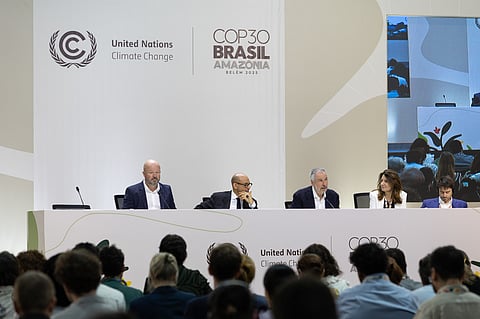

Negotiators at COP30 have spent eight hours behind closed doors with no breakthrough on four unresolved issues.
Finance under Article 9.1, unilateral trade measures, NDC synthesis, and transparency of climate data remain the main sticking points.
COP30 President André Corrêa do Lago has extended consultations until Saturday to seek consensus.
Developing-country groups insist that developed nations must meet legal finance obligations under the Paris Agreement.
Sharp divides persist between blocs including LMDCs, AOSIS, the EU, and others on how these issues should be integrated into the final outcome.
Over the last two days, negotiators at 30th Conference of Parties (COP30) to the United Nations Framework Convention on Climate Change (UNFCCC) in Belém, Brazil have already spent eight hours behind closed doors discussing how four unresolved issues — financial obligations of rich countries, responding to the synthesis report on climate goals and addressing the 1.5 degrees Celsius (°C) ambition and implementation gap, unilateral trade measures, and the transparency of national climate data — will be included in the final outcome.
But by the end of November 12, 2025 the talks remained deadlocked on these items, with COP30 President André Corrêa do Lago buying time until November 15 to report on progress.
Despite a smoother-than-expected start on November 10, with the Brazilian presidency averting an ‘agenda fight’, some of the thorniest issues remain stalled.
On November 10, four issues were omitted from the adopted agenda for the two-week climate summit and it was decided to take them up in Presidential Consultations. These issues are:
Implementation of Article 9.1 of the Paris Agreement, which was proposed to be added to the agenda by the Like-Minded Developing Countries (LMDC) bloc, which includes India and is a top priority for developing countries and small island nations.
Promoting international cooperation and addressing concerns with climate change-related trade-restrictive unilateral measures.
Responding to the synthesis report on nationally determined contributions (NDCs), or climate goals, and addressing the 1.5°C ambition and implementation gap.
Synthesis of biennial transparency reports (BTRs), the main instrument through which Parties communicate progress towards their NDCs, as well as their greenhouse gas emissions, adaptation efforts, and support provided or received.
On November 12, 2025, while the Presidency described the mood and spirit during the consultations as “constructive” and “positive”, there seemed to be several divides among Parties on the above issues.
Túlio Andrade, director of strategy and alignment for COP30, informed journalists that the negotiating countries and blocs were “very far from one another”. “This is a very complex process, parties are very far from one another. But what we are seeing is a movement in which they are getting closer by combining one position with the other. We naturally need more time,” he said.
When asked by Down To Earth about the challenges in concluding the consultations, Andrade pointed to geopolitical difficulties and socio-economic challenges. “So naturally there are very high expectations of resources and scientific needs for resources when countries are showing that they have issues domestically in their own constituencies. So this is perhaps the main challenge that we are having in relation to the provision of climate finance and 9.1,” he said.
On November 12 evening, COP30 President André Corrêa do Lago was scheduled to talk about progress on the four issues in a special stocktaking plenary. However, the plenary lasted only 10 minutes, with him announcing that consultations would continue until Saturday, when another stocktaking plenary will be held. “On Saturday, we may bring you wonderful solutions brought by the party, to bridge all these issues,” he said in a press conference after the plenary.
However, it is not clear how these solutions will be integrated into the formal outcome — whether through a cover decision, a work programme, or by referring them to subsidiary bodies.
Finance remains at the heart of the stalemate. Developing-country groups continue to insist that developed nations fulfil their legal obligations under Article 9.1 of the Paris Agreement.
During the consultations, India, on behalf of LMDCs, has called for a three-year work programme (till 2028) on Article 9.1 and said that a mere “call” will not be enough.
Further, on including the synthesis of NDCs in the agenda, India said there is already a process for it and reiterated its work programme proposal, saying that finance is central to the issue.
Andrade said India is “very engaged” in the process and “presenting collaborative solutions”.
However, the synthesis report on NDCs and addressing the 1.5°C ambition and implementation gap was requested for inclusion in the agenda by the Alliance of Small Island States in the last two weeks leading up to COP30. And the proposal for inclusion of the synthesis of BTRs was put forward by Denmark and the European Union just five days before COP30 opened.